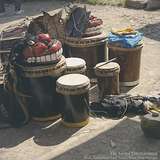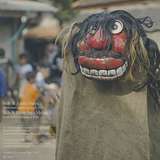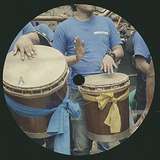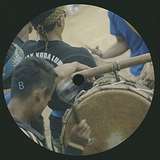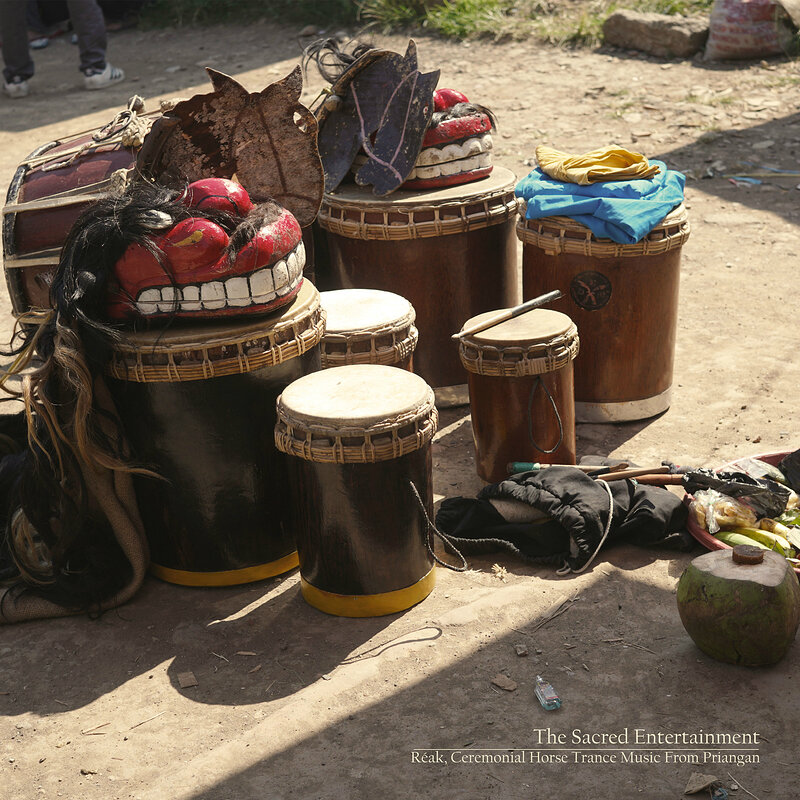Various Artists: The Sacred Entertainment (Réak, Ceremonial Horse Trance Music from Priangan)
Ancient futurist music from ‘the morning of the world’: Java
‘Kasenian réak is a genre of performative art from the Priangan area of west Java, organized during hajatans (life-cycle celebrations) and nowadays primarily held during weddings andcircumcisions. The style, known as a seni lungsuran, is part of the greater family of Javanese
horse dances, originally known in their most famous forms of jathilan and kuda lumping. Javanese horse dances, which could be as old as animistic Java, may already have been practiced before the eight century, travelling through the island and reaching Priangan in the thirties, when réak is believed to have been originated and popularised by musical groups Juarta Putra and Maska Putra. While bearing more than some resemblances with its family, kasenian réak benefits of structures and aesthetic tracts of its own, being not only one of the newest developments of horse dance if not the newest, but also its rawest and most extreme outcome.
The shows usually last up to nine hours, starting at nine o’clock in the morning and finishing between five or six o’clock in the afternoon. the morning part is dedicated to the pembukaan (ouverture), lasting up to one hour and dogcing or dogdog cicing (meaning playing the dogdog
on spot), while the afternoon is the time during which the arak-arakan (parade) takes place. After the arak-arakan goes around the village gathering people and announcing the celebration, it returns to the lot where it had begun and the show ends after a second and much shorter dogcing. During the first dogcing it is possible to witness the dance of Bangbarongan: an animal-like creature costume representing a spirit and an ancestor, worn by a dancer who brings it alive for some hours. This is among the most exciting parts of the show. Sometimes it is also possible to witness a symbolic fight between the pimpinan and the Barong.
Trance and possession obviously represent two of the main attractions of the style. The music as a sonic signal given by the speeded tempo, along with an adorcistic practice conducted by the ma’alim are capable of inviting spirits to enter bodies and take control of them. When possessed, the individuals can, according to the entity they host, exhibit superhuman capacities that allow them to eat burning charcoal and glass, open coconuts with their bare teeth and break bricks
with their foreheads.
This release aims to provide a spectrum of kasenian réak and its music. For this reason, on the first side it is possible to listen to a classic réak ouverture, played by one of the two founding groups, Juarta Putra. On the other side one may hear Putra Jaya Melati: one of the groups that
most attempts to push towards a contemporary, aggressive and experimental version of réak music, without leaving the cultural and spiritual background of the style behind. In this record, it is even possible to hear an electric guitar, gongs, a kendang and a very open repertoire of songs.’
Various Artists: The Sacred Entertainment (Réak, Ceremonial Horse Trance Music from Priangan)
Ancient futurist music from ‘the morning of the world’: Java
| Juarta Putra: Pembukaan | 15:02 | AIFF € 2.50MP3 € 1.75 |
| Putra Jaya Melati: Arak-arakan | 15:56 | AIFF € 2.50MP3 € 1.75 |
| Juarta Putra: Dogcing (Bonus Track) | 71:48 | AIFF € 3.50MP3 € 2.50 |
‘Kasenian réak is a genre of performative art from the Priangan area of west Java, organized during hajatans (life-cycle celebrations) and nowadays primarily held during weddings andcircumcisions. The style, known as a seni lungsuran, is part of the greater family of Javanese
horse dances, originally known in their most famous forms of jathilan and kuda lumping. Javanese horse dances, which could be as old as animistic Java, may already have been practiced before the eight century, travelling through the island and reaching Priangan in the thirties, when réak is believed to have been originated and popularised by musical groups Juarta Putra and Maska Putra. While bearing more than some resemblances with its family, kasenian réak benefits of structures and aesthetic tracts of its own, being not only one of the newest developments of horse dance if not the newest, but also its rawest and most extreme outcome.
The shows usually last up to nine hours, starting at nine o’clock in the morning and finishing between five or six o’clock in the afternoon. the morning part is dedicated to the pembukaan (ouverture), lasting up to one hour and dogcing or dogdog cicing (meaning playing the dogdog
on spot), while the afternoon is the time during which the arak-arakan (parade) takes place. After the arak-arakan goes around the village gathering people and announcing the celebration, it returns to the lot where it had begun and the show ends after a second and much shorter dogcing. During the first dogcing it is possible to witness the dance of Bangbarongan: an animal-like creature costume representing a spirit and an ancestor, worn by a dancer who brings it alive for some hours. This is among the most exciting parts of the show. Sometimes it is also possible to witness a symbolic fight between the pimpinan and the Barong.
Trance and possession obviously represent two of the main attractions of the style. The music as a sonic signal given by the speeded tempo, along with an adorcistic practice conducted by the ma’alim are capable of inviting spirits to enter bodies and take control of them. When possessed, the individuals can, according to the entity they host, exhibit superhuman capacities that allow them to eat burning charcoal and glass, open coconuts with their bare teeth and break bricks
with their foreheads.
This release aims to provide a spectrum of kasenian réak and its music. For this reason, on the first side it is possible to listen to a classic réak ouverture, played by one of the two founding groups, Juarta Putra. On the other side one may hear Putra Jaya Melati: one of the groups that
most attempts to push towards a contemporary, aggressive and experimental version of réak music, without leaving the cultural and spiritual background of the style behind. In this record, it is even possible to hear an electric guitar, gongs, a kendang and a very open repertoire of songs.’
